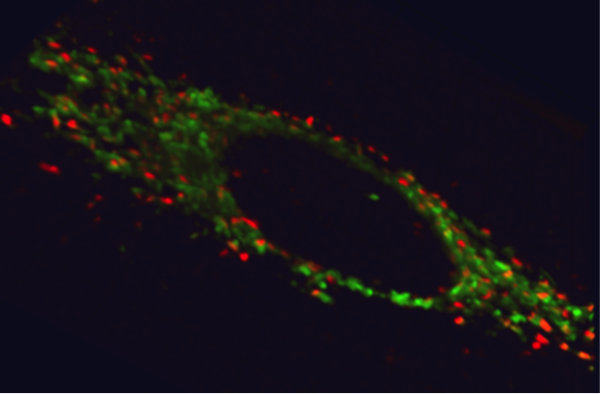Home | About | Faculty | Calendar | Facilities | Graduate program | Contact | Apply
This page is optimized for viewing with javascript.
Roderick Capaldi
Loading profile for Rod Capaldi
Research Interests
My research interests have and continue to focus on the structure and function of mitochondria in health and disease. Briefly, mitochondria function broadly in cell metabolism, including in glucose metabolism (Krebs cycle and oxidative phosphorylation), in fatty acid oxidation, and in nitrogen metabolism (via the urea cycle). They are also involved in cell signaling, and are key to initiation of autophagy and apoptosis. Further, mitochondrial dysfunction is now known to be central to Alzheimers, Parkinsons, diabetes and cancer, and there are also several genetic diseases of mtDNA.Our ongoing work is focused mainly on the ATP Synthase. This enzyme is now known to be present on the plasma membrane in many cells as well as in mitochondria.
The levels of the ectopic ATP synthase are highest in cancer cells where the enzyme acts to modulate cytosolic pH in the acid environment of the tumor. It is present in high levels on liver cells and acts as an HDL receptor. Levels are also high in endothelial cells of blood vessels. Here the ectopic ATP synthase is sensitive to shear force, which releases a subunit of the enzyme to modulate blood pressure. Further, in neuronal cells the ectopic ATP synthase has been identified as a receptor for beta amyloid (in Alzheimers disease) and for viruses such as HIV/AIDS.
We want to know more about how a large enzyme complex, in which some of the subunits are encoded on mtDNA and made on ribosomes inside mitochondria, gets to the plasma membrane. Also, we are screening for compounds that can selectively modulate the various properties of the ectopic ATP synthase with the aim of treating the several human conditions in which the enzyme plays an important role.
 ATP synthase molecules (red) on the surface of an osteosarcoma cell. Mitochondria are labeled by incorporation of GFP. (From Yonelly S and Capaldi RA. (2006)).
ATP synthase molecules (red) on the surface of an osteosarcoma cell. Mitochondria are labeled by incorporation of GFP. (From Yonelly S and Capaldi RA. (2006)).
Recent publications
(pulled from pubmed)
Recent publications
(pulled from pubmed)
A Systematic Assessment of Mitochondrial Function Identified Novel Signatures for Drug-Induced Mitochondrial Disruption in Cells.
Li N, Oquendo E, Capaldi RA, Robinson JP, He YD, Hamadeh HK, Afshari CA, Lightfoot-Dunn R, Narayanan PK
Toxicological sciences : an official journal of the Society of Toxicology 2014
Li N, Oquendo E, Capaldi RA, Robinson JP, He YD, Hamadeh HK, Afshari CA, Lightfoot-Dunn R, Narayanan PK
Toxicological sciences : an official journal of the Society of Toxicology 2014
Uniform nomenclature for the mitochondrial contact site and cristae organizing system.
Pfanner N, van der Laan M, Amati P, Capaldi RA, Caudy AA, Chacinska A, Darshi M, Deckers M, Hoppins S, Icho T, Jakobs S, Ji J, Kozjak-Pavlovic V, Meisinger C, Odgren PR, Park SK, Rehling P, Reichert AS, Sheikh MS, Taylor SS, Tsuchida N, van der Bliek AM, van der Klei IJ, Weissman JS, Westermann B, Zha J, Neupert W, Nunnari J
The Journal of cell biology 2014
Pfanner N, van der Laan M, Amati P, Capaldi RA, Caudy AA, Chacinska A, Darshi M, Deckers M, Hoppins S, Icho T, Jakobs S, Ji J, Kozjak-Pavlovic V, Meisinger C, Odgren PR, Park SK, Rehling P, Reichert AS, Sheikh MS, Taylor SS, Tsuchida N, van der Bliek AM, van der Klei IJ, Weissman JS, Westermann B, Zha J, Neupert W, Nunnari J
The Journal of cell biology 2014
ALS-linked mutant superoxide dismutase 1 (SOD1) alters mitochondrial protein composition and decreases protein import.
Li Q, Vande Velde C, Israelson A, Xie J, Bailey AO, Dong MQ, Chun SJ, Roy T, Winer L, Yates JR, Capaldi RA, Cleveland DW, Miller TM
Proceedings of the National Academy of Sciences of the United States of America 2010
Li Q, Vande Velde C, Israelson A, Xie J, Bailey AO, Dong MQ, Chun SJ, Roy T, Winer L, Yates JR, Capaldi RA, Cleveland DW, Miller TM
Proceedings of the National Academy of Sciences of the United States of America 2010
Novel antibody-based strategies for the rapid diagnosis of mitochondrial disease and dysfunction.
Marusich MF, Murray J, Xie J, Capaldi RA
The international journal of biochemistry & cell biology 2009
Marusich MF, Murray J, Xie J, Capaldi RA
The international journal of biochemistry & cell biology 2009
Lateral-flow immunoassay for detecting drug-induced inhibition of mitochondrial DNA replication and mtDNA-encoded protein synthesis.
Nadanaciva S, Willis JH, Barker ML, Gharaibeh D, Capaldi RA, Marusich MF, Will Y
Journal of immunological methods 2009
Nadanaciva S, Willis JH, Barker ML, Gharaibeh D, Capaldi RA, Marusich MF, Will Y
Journal of immunological methods 2009
Screening for the metabolic basis of neurodegeneration: developing a focused proteomic approach.
Murray J, Capaldi RA
Annals of the New York Academy of Sciences 2008
Murray J, Capaldi RA
Annals of the New York Academy of Sciences 2008
Isolated deficiencies of OXPHOS complexes I and IV are identified accurately and quickly by simple enzyme activity immunocapture assays.
Willis JH, Capaldi RA, Huigsloot M, Rodenburg RJ, Smeitink J, Marusich MF
Biochimica et biophysica acta 2009
Willis JH, Capaldi RA, Huigsloot M, Rodenburg RJ, Smeitink J, Marusich MF
Biochimica et biophysica acta 2009
Mitochondrial oxidative phosphorylation protein levels in peripheral blood mononuclear cells correlate with levels in subcutaneous adipose tissue within samples differing by HIV and lipoatrophy status.
Shikuma CM, Gerschenson M, Chow D, Libutti DE, Willis JH, Murray J, Capaldi RA, Marusich M
AIDS research and human retroviruses 2008
Shikuma CM, Gerschenson M, Chow D, Libutti DE, Willis JH, Murray J, Capaldi RA, Marusich M
AIDS research and human retroviruses 2008
Monitoring oxidative and nitrative modification of cellular proteins; a paradigm for identifying key disease related markers of oxidative stress.
Murray J, Oquendo CE, Willis JH, Marusich MF, Capaldi RA
Advanced drug delivery reviews 2008
Murray J, Oquendo CE, Willis JH, Marusich MF, Capaldi RA
Advanced drug delivery reviews 2008
Lateral-flow immunoassay for the frataxin protein in Friedreich's ataxia patients and carriers.
Willis JH, Isaya G, Gakh O, Capaldi RA, Marusich MF
Molecular genetics and metabolism 2008
Willis JH, Isaya G, Gakh O, Capaldi RA, Marusich MF
Molecular genetics and metabolism 2008
Early developmental pathology due to cytochrome c oxidase deficiency is revealed by a new zebrafish model.
Baden KN, Murray J, Capaldi RA, Guillemin K
The Journal of biological chemistry 2007
Baden KN, Murray J, Capaldi RA, Guillemin K
The Journal of biological chemistry 2007
Mitochondrial impairment by PPAR agonists and statins identified via immunocaptured OXPHOS complex activities and respiration.
Nadanaciva S, Dykens JA, Bernal A, Capaldi RA, Will Y
Toxicology and applied pharmacology 2007
Nadanaciva S, Dykens JA, Bernal A, Capaldi RA, Will Y
Toxicology and applied pharmacology 2007
The mitochondrial inner membrane protein mitofilin exists as a complex with SAM50, metaxins 1 and 2, coiled-coil-helix coiled-coil-helix domain-containing protein 3 and 6 and DnaJC11.
Xie J, Marusich MF, Souda P, Whitelegge J, Capaldi RA
FEBS letters 2007
Xie J, Marusich MF, Souda P, Whitelegge J, Capaldi RA
FEBS letters 2007
Angiostatin-like activity of a monoclonal antibody to the catalytic subunit of F1F0 ATP synthase.
Chi SL, Wahl ML, Mowery YM, Shan S, Mukhopadhyay S, Hilderbrand SC, Kenan DJ, Lipes BD, Johnson CE, Marusich MF, Capaldi RA, Dewhirst MW, Pizzo SV
Cancer research 2007
Chi SL, Wahl ML, Mowery YM, Shan S, Mukhopadhyay S, Hilderbrand SC, Kenan DJ, Lipes BD, Johnson CE, Marusich MF, Capaldi RA, Dewhirst MW, Pizzo SV
Cancer research 2007
Small-scale immunopurification of cytochrome c oxidase for a high-throughput multiplexing analysis of enzyme activity and amount.
Murray J, Schilling B, Row RH, Yoo CB, Gibson BW, Marusich MF, Capaldi RA
Biotechnology and applied biochemistry 2007
Murray J, Schilling B, Row RH, Yoo CB, Gibson BW, Marusich MF, Capaldi RA
Biotechnology and applied biochemistry 2007
